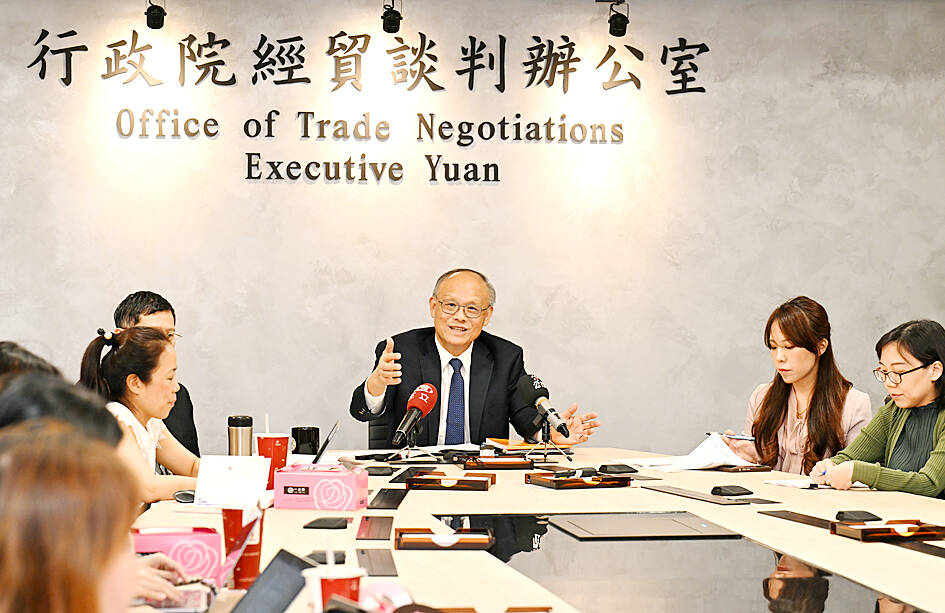Taiwan and Canada have completed negotiations on a pact aimed at promoting investment and protection, about nine months after talks began in February, the two countries announced simultaneously yesterday evening.
The deal, if ratified, “will be beneficial for Taiwanese small and medium-sized enterprises who want to expand their investment presence” in Canada and “support Taiwan’s goal of achieving net-zero transformation,” the Office of Trade Negotiations (OTN) said in a press release.
A statement issued by Global Affairs Canada (GAC), Department of Foreign Affairs, Trade and Development of the Canadian Government, said that the arrangement, once in effect, would help strengthen trade and investment between Canada and Taiwan.

Photo: Tien Yu-hua, Taipei Times
“Today’s announcement showcases Taiwan as an important trade and investment partner, especially as Canada deepens its economic partnerships and relationships in the Indo-Pacific region as part of its Indo-Pacific Strategy,” the GAC said.
A foreign investment promotion and protection arrangement (FIPA), which comprises over 70 articles and appendices, will be formally signed after the completion of the legal text review and respective administrative procedures, according to the two parties.
In line with recent international investment agreements, the FIPA incorporates comprehensive investment protection norms and restricts the host country from imposing additional investment restrictions beyond what has been mutually agreed upon, to ensure investors enjoy a predictable and stable investment environment, the OTN said.
Meanwhile, the host country retains the right to regulate in accordance with its domestic policy objectives while recognizing values such as corporate social responsibility, cultural diversity, environmental protection, gender equality, labor rights and inclusive growth, it said.
Taiwan and Canada formally launched talks on an investment agreement in February, following a year of exploratory discussions on the key concepts of the pact.
With thorough preparation, the negotiation process proceeded smoothly, and a fruitful outcome achieved in less than a year, the OTN said, adding that the office also conducted forums and video conferences with industry stakeholders and relevant parties throughout the process.
The “high-standard investment agreement” clearly demonstrates that both parties adhere to high-standard international economic and trade rules, the OTN said.

SEEKING CLARITY: Washington should not adopt measures that create uncertainties for ‘existing semiconductor investments,’ TSMC said referring to its US$165 billion in the US Taiwan Semiconductor Manufacturing Co (TSMC, 台積電) told the US that any future tariffs on Taiwanese semiconductors could reduce demand for chips and derail its pledge to increase its investment in Arizona. “New import restrictions could jeopardize current US leadership in the competitive technology industry and create uncertainties for many committed semiconductor capital projects in the US, including TSMC Arizona’s significant investment plan in Phoenix,” the chipmaker wrote in a letter to the US Department of Commerce. TSMC issued the warning in response to a solicitation for comments by the department on a possible tariff on semiconductor imports by US President Donald Trump’s

The government has launched a three-pronged strategy to attract local and international talent, aiming to position Taiwan as a new global hub following Nvidia Corp’s announcement that it has chosen Taipei as the site of its Taiwan headquarters. Nvidia cofounder and CEO Jensen Huang (黃仁勳) on Monday last week announced during his keynote speech at the Computex trade show in Taipei that the Nvidia Constellation, the company’s planned Taiwan headquarters, would be located in the Beitou-Shilin Technology Park (北投士林科技園區) in Taipei. Huang’s decision to establish a base in Taiwan is “primarily due to Taiwan’s talent pool and its strength in the semiconductor

An earnings report from semiconductor giant and artificial intelligence (AI) bellwether Nvidia Corp takes center stage for Wall Street this week, as stocks hit a speed bump of worries over US federal deficits driving up Treasury yields. US equities pulled back last week after a torrid rally, as investors turned their attention to tax and spending legislation poised to swell the US government’s US$36 trillion in debt. Long-dated US Treasury yields rose amid the fiscal worries, with the 30-year yield topping 5 percent and hitting its highest level since late 2023. Stocks were dealt another blow on Friday when US President Donald

UNCERTAINTY: Investors remain worried that trade negotiations with Washington could go poorly, given Trump’s inconsistency on tariffs in his second term, experts said The consumer confidence index this month fell for a ninth consecutive month to its lowest level in 13 months, as global trade uncertainties and tariff risks cloud Taiwan’s economic outlook, a survey released yesterday by National Central University found. The biggest decline came from the timing for stock investments, which plunged 11.82 points to 26.82, underscoring bleak investor confidence, it said. “Although the TAIEX reclaimed the 21,000-point mark after the US and China agreed to bury the hatchet for 90 days, investors remain worried that the situation would turn sour later,” said Dachrahn Wu (吳大任), director of the university’s Research Center for